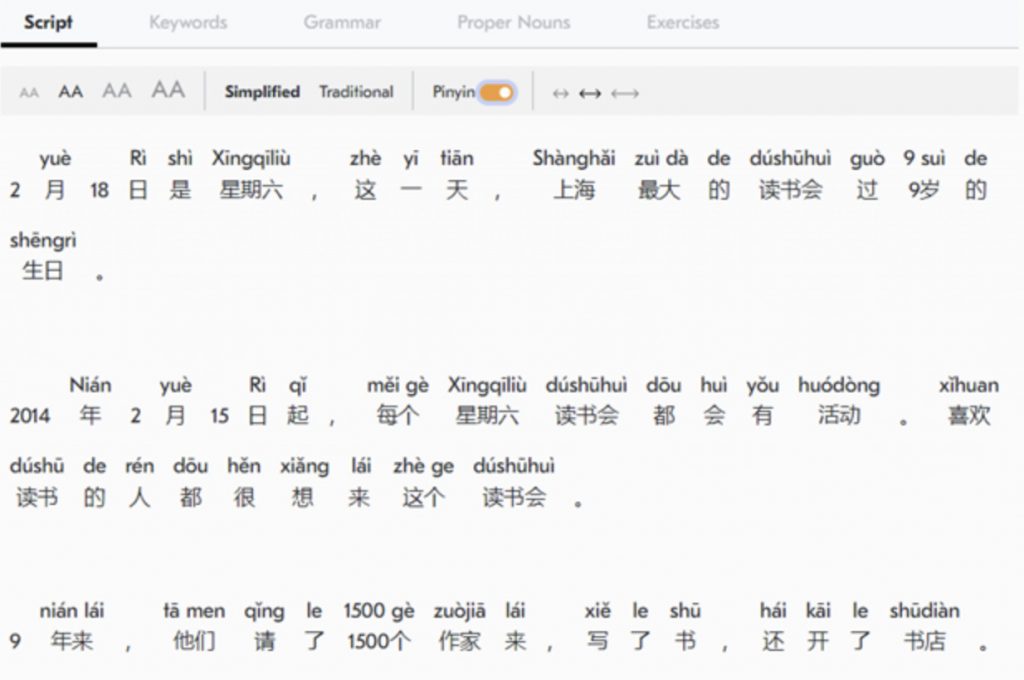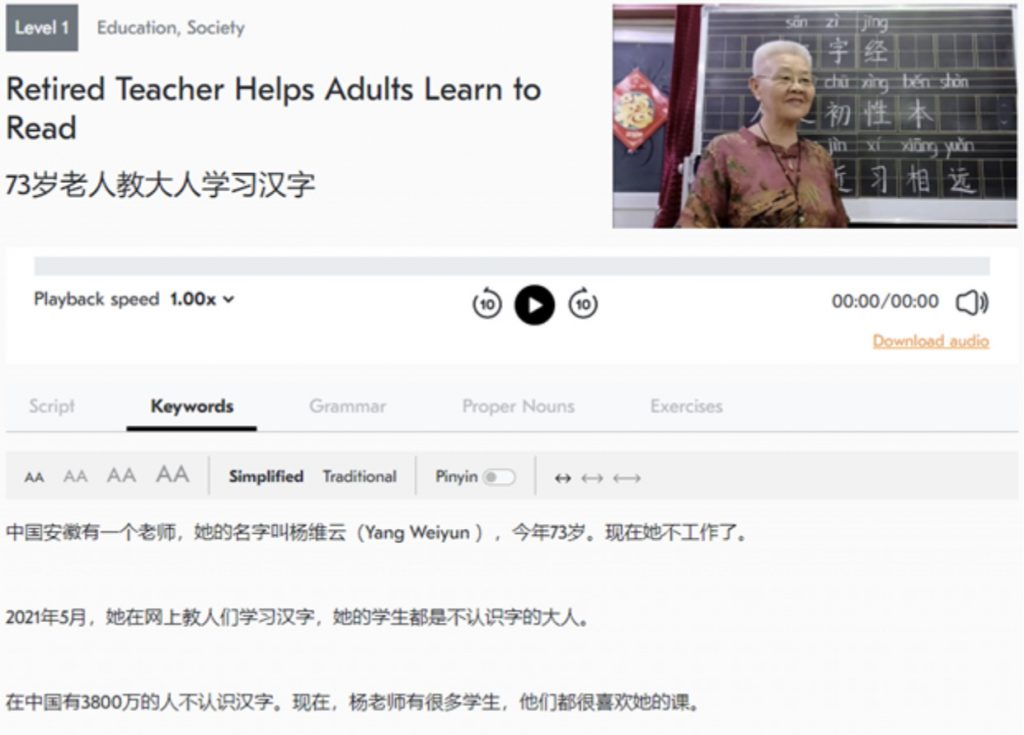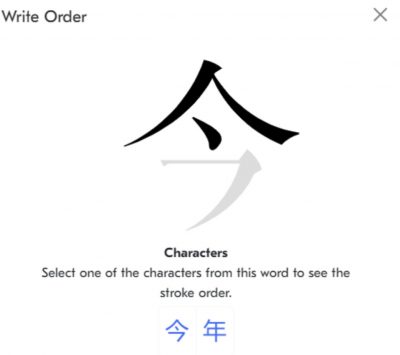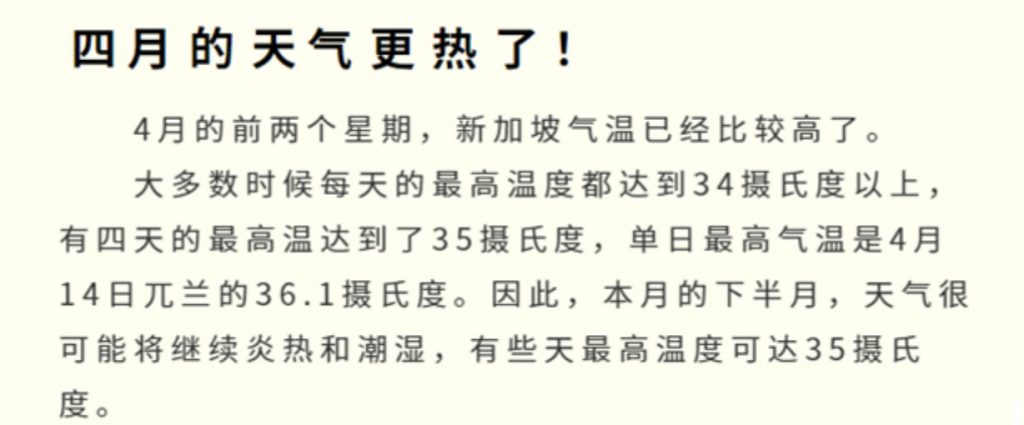
Many Mandarin learners can benefit from incorporating more authentic materials, such as Chinese articles, into their study of the language. Authentic materials include text, audio and video content aimed at native speakers. In contrast to authentic sources, language textbook materials generally have no purpose besides teaching the language; they are not written to inform, inspire or entertain the reader – or at least, these are not primary considerations.
How does this apply to beginner learners, who are not equipped to access authentic materials? The solution for beginners is to jump into using immersive content, like simple Chinese news articles or short stories, which are adjacent to authentic materials. In this article, we’ll explore sources of Chinese news for beginners (and other accessible reading material in Chinese), which are appropriate for a range of language levels from HSK1 and up. We’ll also present some tips on how to optimise the reading experience for beginner learners using recommended apps and tools.
10 reasons to study Chinese through news
Learning with news is a great strategy for growing your vocabulary and honing your reading skills. Here are some of the reasons why:
- You can stay informed about current affairs while learning a new skill.
- You’ll absorb more information about Chinese culture, society, history, politics, etc by consuming news in Mandarin.
- You’ll keep up to date with emerging topics in the Chinese-speaking world.
- You can explore topics of special interest, whether that is sport, travel, entertainment, gaming, food, arts, or something else.
- You’ll be exposed to a wide range of vocabulary and grammar in a meaningful context.
- You’ll never run out of reading material, because news is ever-evolving.
- News stories are connected to real people and events in the world. This type of content is more meaningful and relevant to the average reader than fabricated texts found in language textbooks.
- Chinese news articles for beginners are easier to digest and less intimidating than reading a book in Chinese.
- You can connect Chinese news articles with your own knowledge of the world, which will aid comprehension and boost confidence.
- Reading and listening (to news) are excellent practices to advance your skills in a language, whatever your level. When you see and hear new words in multiple contexts, after enough repetitions, you will learn and use those words in your own writing and speaking. (Note that this is the same way we learned to master our native language!)
Can beginners learn Chinese through news?
Yes! There is no great secret to language learning, even for a language like Mandarin, which has a reputation of being very challenging. The fundamental steps are:
- Start learning.
- Stay committed.
- Study often (as much as you can manage – 20 minutes a day is better than 2 hours once per week).
Admittedly that is a very broad generalisation of what it takes to learn a language, and every language has its own idiosyncracies that make it uniquely challenging, depending on the learner’s native language. For example, Chinese characters and tones are some of the more challenging aspects for learners to master, if they are coming from a monolingual English-speaking background. Language-learning plateaus also occur during the process. But if you focus on all the potential difficulties and pitfalls, you’ll find excuses not to even begin – so, don’t do that; focus on what you can do, right now, to improve on your current level.
Chinese news can indeed be accessible for beginner learners, as long as the right tools and adaptations are included. There is a tendency for language learners to believe they have to start with “the basics”, such as “My name is __” and “How old are you?”. But there’s actually no reason why – with the appropriate tools – you can’t begin exploring more interesting content from the very beginning, rather than following what conventional wisdom dictates is the correct way of learning a language.
Useful adaptations for beginners reading Chinese news
Obviously it isn’t possible for Chinese newbies to dive right into China Daily or BBC Zhongwen – it would be completely counterproductive and fruitless. What beginners need is simple and repetitive content, at least until the vocabulary and sentence patterns begin to stick. This is why adapted news sources such as The Chairman’s Bao are perfect for beginners – a beginner could start by reading a HSK1 news article, which is comprised of just a few short paragraphs.
As well as selecting the right level, beginners can also benefit from having other tools and adaptations in place:
Pinyin
This is of course the Romanised version of Chinese. It has its limitations, due to the great number of homophones in Mandarin – but at least when you start learning to read Chinese, pinyin allows the reader to decipher what the pronunciation and tones are, even if the meaning of the words isn’t yet committed to memory. Most good Chinese reading platforms have the ability to turn pinyin on or off, including The Chairman’s Bao, DuChinese and LingQ.
Spacing adjustment
Unlike English and other European languages, written Chinese has no spaces between words. That can make reading especially challenging, when you not only have to get to grips with characters, but you also have to figure out where one word ends and the next begins… Except, you don’t have to do that with The Chairman’s Bao! You can increase the spaces between words for easier reading. (I love this feature!)
Dictionary
True beginners will not know any Chinese words, and unlike, say, Spanish, it’s not really possible to guess what new words mean because there is usually no resemblance to English at all. So obviously, a dictionary/translation tool is necessary. Again, good Chinese reading apps have this feature built in. With apps like The Chairman’s Bao, Beelinguapp and LingQ, the user can click or tap on any word in the text, and get an instant English translation. Better yet, these apps allow you to save words to your own vocabulary bank for later review.
Audio
Reading by itself is excellent, but reading and listening together is even better, for obvious reasons. By listening to a native speaker read as you follow along with the text, you acclimate your ear to the sounds, tones and rhythm of natural spoken Mandarin. If you use an app with additional learning tools, like The Chairman’s Bao, you can do reading and listening quizzes to practise those skills independently.

7 Sources of Easy Chinese Articles for Beginners
- The Chairman’s Bao
- DuChinese
- Beelinguapp
- LingQ
- ZBschools
- Todai Chinese
- ChatGPT
Easy Chinese News Articles for Beginners and More Advanced Learners
-
The Chairman’s Bao
You can access easy Chinese news articles at beginner’s HSK 1 level through The Chairman’s Bao website and app. All articles are written by native speakers according to HSK vocabulary and grammar criteria, and there is always fresh, new and engaging content to read on a daily basis. Topics are centered around China and the Mandarin-speaking world, with some global news stories included as well. Any subject you can think of, there is likely to be an article on it!

TCB articles include a live dictionary, where every word or phrase can be clicked to retrieve an English definition and an audio recording. You can see the stroke order animation and practise writing characters, if this is a skill that you wish to develop. You also have the option to save any vocabulary item to your personal learning hub and test yourself with the flashcard system.

The Chairman’s Bao is unique in providing Chinese news articles at so many different levels. It can be a real challenge to find simple Chinese news for beginners and intermediate learners, so TCB is an excellent solution for learners in that category, who otherwise may not be well catered for.
-
DuChinese
DuChinese is a very popular app for its broad selection of easy Chinese short stories and news coverage. Compared to The Chairman’s Bao, DuChinese news content is limited, but you’ll find occasional updates on current events and hot topics pertaining to China. Reading material can be filtered by category and/or HSK reading level. The pinyin, dictionary, HSK colour-coding, and other interactive features make DuChinese very beginner-friendly.
-
Beelinguapp
This multilingual app offers an immersive reading experience, thanks to its side-by-side Chinese-English format. There is a huge selection of easy Chinese short stories, daily news articles, non-fiction reading material, and more available within the app. Beelinguapp is a good option for those studying more than one language, as it’s available in many languages besides Chinese.
-
LingQ
Like Beelinguapp, LingQ is an excellent choice for polyglots with a passion for learning multiple languages at once, as the platform was designed by a renowned polyglot and it makes switching between languages absolutely effortless. The whole premise of LingQ is immersing yourself in the target language from day one, with the help of interactive reading and listening material. The library includes a growing number of Chinese articles to read, as well as easy Chinese short stories, and many interactive features to assist you on your language-learning journey.
-
ZBschools
This Singaporean website, aimed at kids, contains short and simple Chinese articles to read. Not only that, but there are also videos, audio, and English annotations. The site has an attractive and accessible layout that is easy to navigate, and both beginners and intermediate learners could find suitable reading material here.

-
Todai Chinese
Todai Chinese is a free app (paid, ad-free version also available) which compiles authentic Chinese news articles and presents them in a learner-friendly interactive format. There is an extremely useful HSK colour-coding system (similar to that of DuChinese), which provides a visual guide to the proportion of words at different HSK levels within each article. For example, HSK1 words are underlined in purple, HSK2 words underlined in blue, and so on. AI-generated audio is also included.
-
ChatGPT
We’ve all heard how powerful and revolutionary the AI chatbot is: it can engage in humanlike conversations, support teachers with lesson planning, and make it all too easy for students to cheat on their homework. And when it comes to providing Chinese articles for beginners to read, ChatGPT does not disappoint. It should be treated with caution, however – its knowledge is not infallible, and a beginner wouldn’t have the language level to spot mistakes in its output. With that said, ChatGPT can be prompted in the following way:

Clearly, the above is not suited to a complete beginner, but it gives a taste of what ChatGPT can do. A beginner Chinese learner could take advantage of a tool like MandarinSpot (mentioned previously), which will convert any Chinese text such as the above into a learner-friendly annotated version.
Honorable mentions
The following websites don’t offer Chinese news articles for beginners, but they are still useful for other reasons, so worth taking a look.
-
MandarinSpot
If you are browsing Chinese language websites rather than using one of the recommended apps designed for learners (such as The Chairman’s Bao), there is a very useful tool which will convert any Chinese text into a more readable format – it’s called MandarinSpot. The text that you paste into the box will be enhanced with pinyin, spacing between words, and a dictionary (hover over individual words to see the English version). There are also browser extensions you can install that serve the same purpose.

-
HSKReading
HSKReading articles are written by native Chinese speakers and there is a huge variety of easy Chinese articles for beginners (from HSK1 and up). HSKReading is an ideal free tool for Mandarin language learners for vocabulary-building, exposure to grammar and sentence structure, and listening practice. All articles feature relevant topics about daily Chinese life and culture.
-
SysMandarin
This YouTube channel takes authentic Chinese content – such as Chinese news, songs, speeches, and TV shows – and breaks it down for learners. The video lessons are of a reasonable length, they are well presented with thorough explanations, and you can enjoy all this content for free.
-
FluentU
We started by extolling the benefits of authentic materials for language-learning, and the FluentU platform aims to capitalise on those benefits using native Mandarin videos, from movie trailers to commercials. FluentU videos feature interactive subtitles to make the content accessible, immersive, and learner-friendly for any level. New users can trial the platform for free, and then sign up for continued access.
-
BBC 中文
This free news website isn’t suitable for beginners, but it provides good material for more advanced learners looking for Chinese articles written through an international lens.
How to approach reading Chinese articles
- As a warmup, read the headlines and practise identifying characters that you already know.
- Skim the article first to get an idea of the length, structure, and difficulty of the text, and notice any frequent words that occur throughout the article.
- Read slowly and intensively the first time, looking up words that you don’t know and keeping a mental note. (If you use The Chairman’s Bao or another interactive reading app, you can save new words directly to your vocabulary bank.) The second time(s), now that you have a better understanding of the vocabulary and gist, try to increase your reading speed and improve your comprehension.
- If you have time, extend your study by: writing a summary of the article in your own words; writing your own English translation without using a translation tool; or completing a quiz (The Chairman’s Bao includes quizzes with every article, these should take you around 10-20 minutes to complete).
- Choose a selection of your favourite websites or apps with Chinese articles to read, and use them in rotation. Read Chinese articles whenever the opportunity arises, and build the habit into your daily study routine.
- Consistency is important, but if you miss some study days, don’t stress about it – just jump back in as soon as possible.
Summary
In conclusion, easy Chinese news articles are a great starting point for beginner learners to ease their way into reading in Chinese and building effective study habits. Websites and apps such as The Chairman’s Bao, DuChinese or LingQ are packed with regularly-updated content, which will keep your interest and motivation high. Taking advantage of free tools like ChatGPT and MandarinSpot can also enhance your learning at no extra cost.
This article has provided beginner learners with plenty of ideas and sources of Chinese reading material to get started. Go ahead and explore the wealth of resources for improving your Chinese – 加油 jiāyóu!
Author

Daisy Ward is an experienced online English teacher, writer and content creator with a passion for foreign languages and cultures. Her expertise in effective language-learning strategies is derived from many years in language classrooms, both as a teacher and as a student. Fluent in French and competent in Mandarin Chinese, she attributes much of her success in learning languages to the use of apps and other online tools.























